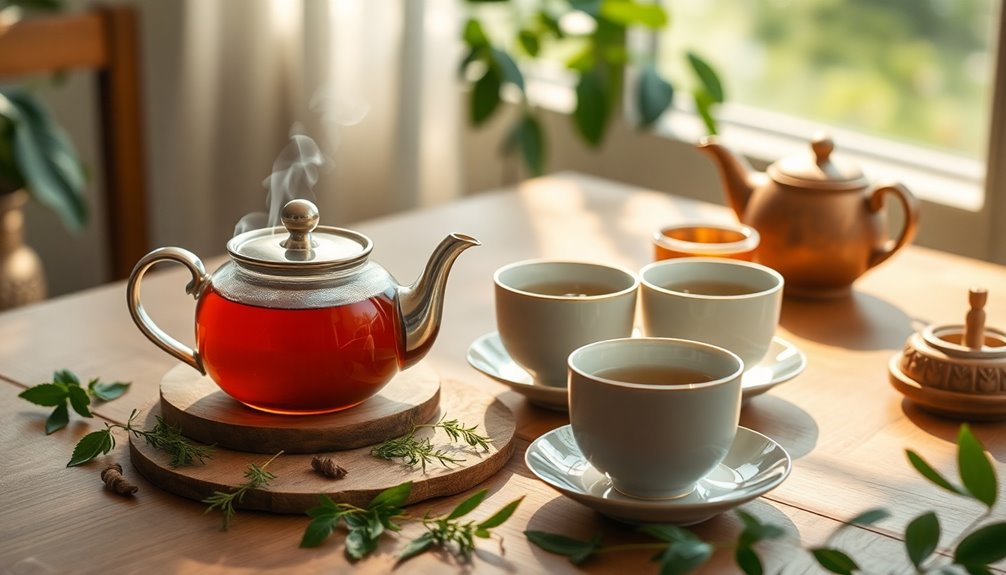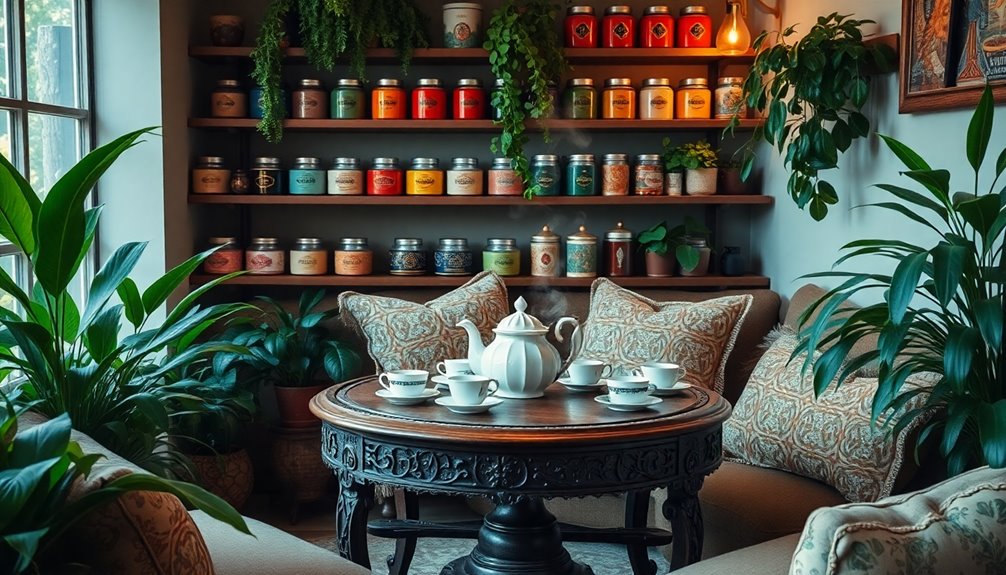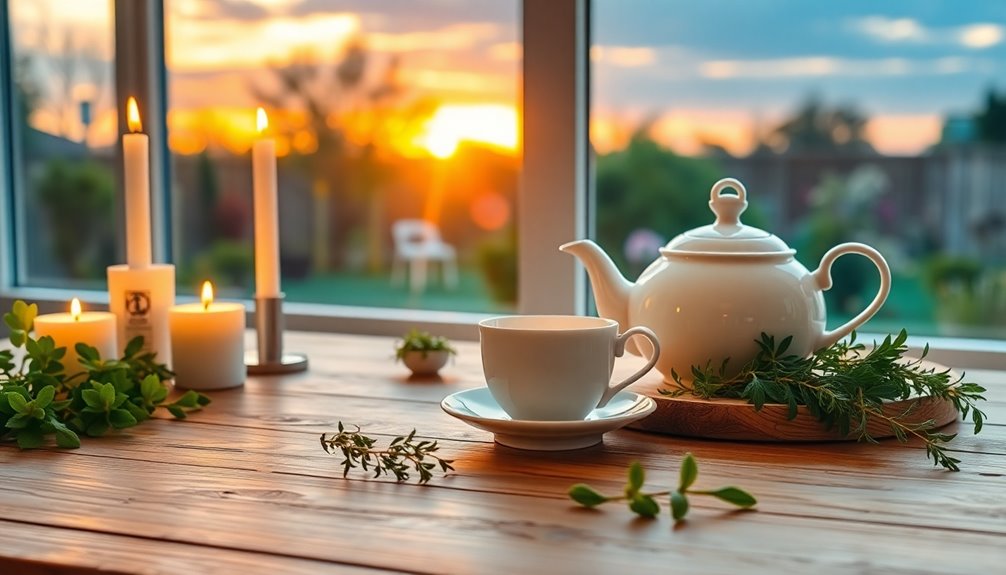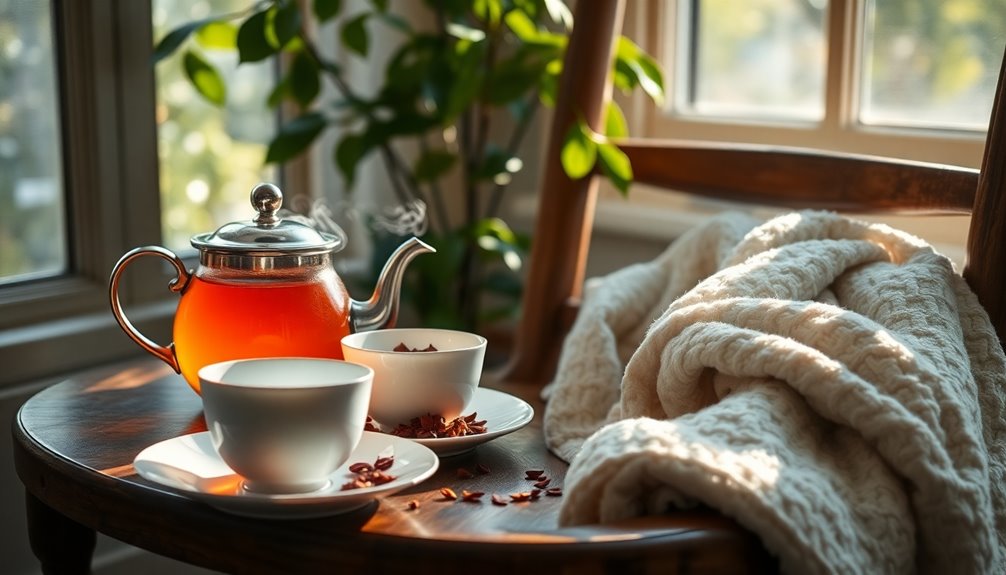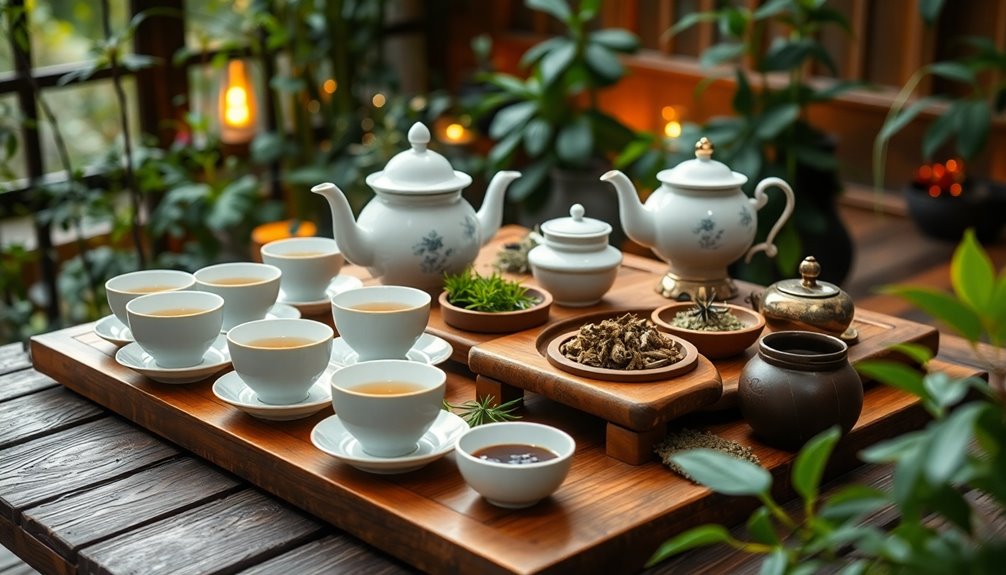Rituals make your tea taste better because they foster mindfulness and enhance sensory experience. When you engage in intentional actions, like selecting your favorite mug or carefully brewing your tea, you become more aware of the flavors and aromas. This heightened awareness improves your appreciation of every sip. Proper preparation and brewing conditions, such as using the right water temperature and steeping time, further influence the flavor profile. Overall, these small rituals deepen your connection to the moment and elevate your tea experience. There's so much more to discover about enhancing your brewing practices to make your tea truly special.
Key Takeaways
- Engaging in tea rituals fosters mindfulness, enhancing appreciation of flavors and aromas during the drinking experience.
- Intentional actions in tea preparation improve taste perception, making the beverage feel more satisfying and flavorful.
- Proper tea preparation, including steeping time and temperature, is crucial for optimal flavor extraction and enjoyment.
- Ritualistic practices, like selecting a favorite mug, enrich daily life and deepen the connection to the tea experience.
- Consistent participation in rituals cultivates a greater awareness of the present moment, leading to a more enjoyable tea experience.
Introduction
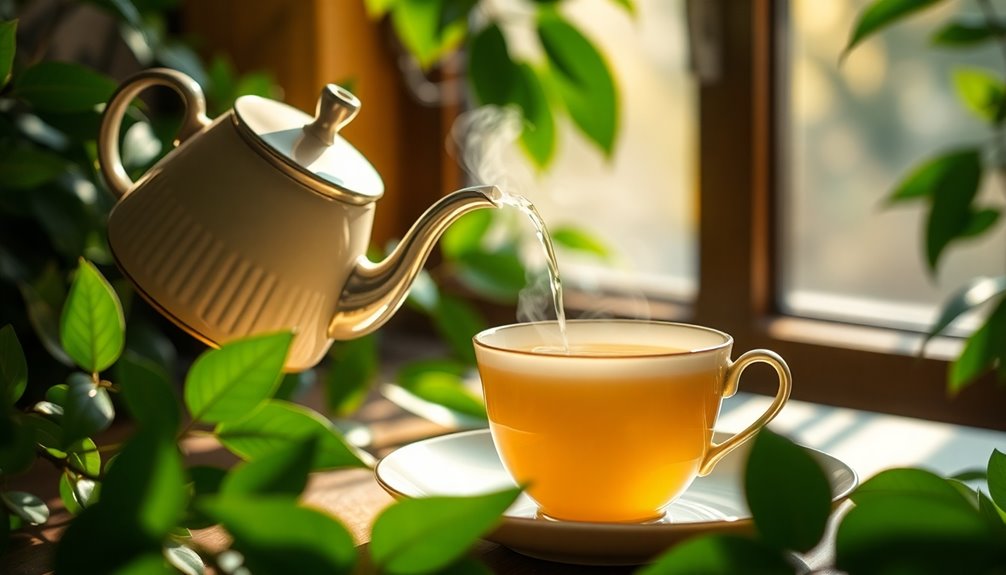
Preparing tea can be a transformative experience when you incorporate meaningful rituals into the process. Engaging in tea rituals not only enhances the flavors but also deepens your connection to the moment. When you measure out the tea leaves or pour hot water over them with intention, you create a structured environment that elevates your Daily Tea routine.
These intentional actions foster mindfulness, allowing you to truly appreciate the aromas and flavors. Studies show that participating in rituals can improve taste perception, leading you to rate your tea as more flavorful. By pausing to reflect during the brewing process, you can savor each sip more fully. This mindfulness enhances the health benefits associated with tea, making your experience more rewarding.
Take the time to engage in rituals that resonate with you, whether it's selecting your favorite mug or appreciating the steam rising from your cup. These small yet impactful actions not only make tea preparation enjoyable but also transform it into a ritual that enriches your daily life.
Embracing these practices can turn a simple cup of tea into a moment of joy and reflection.
Tea Enhances Sensory Experience
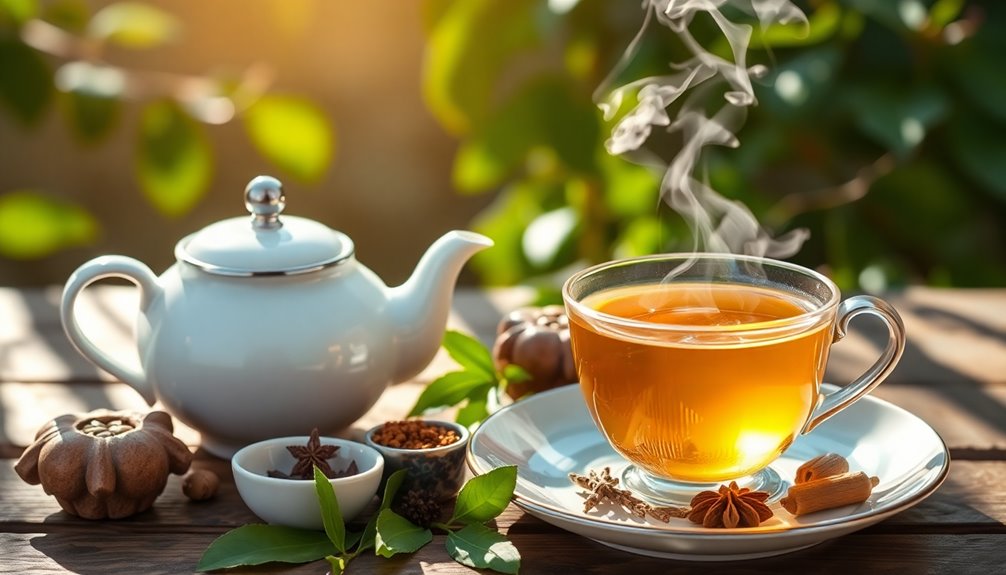
Through intentional engagement in tea rituals, you can significantly enhance your sensory experience. When you carefully measure tea leaves and observe the brewing process, you heighten your awareness of the flavors, aromas, and textures involved. This focused attention enhances the flavor experience, allowing you to appreciate the complexities of each cup.
Ritualistic actions, such as infusing tea with purpose and savoring its aroma, dramatically increase your perception of taste. You'll find that the tea feels more flavorful, satisfying your palate in ways you may not have noticed before.
By consistently participating in these rituals, you cultivate a deeper connection to the present moment, enriching your appreciation for the tea's unique flavor profiles. Studies show that performing rituals while enjoying food or drink elevates taste perception, indicating that the structured interactions in tea rituals can truly enhance the sensory experience. Additionally, just as coffee can stimulate gastric acid production and aid digestion, coffee's health benefits can influence how flavors are perceived in different beverages.
Tea Preparation Influences Flavor
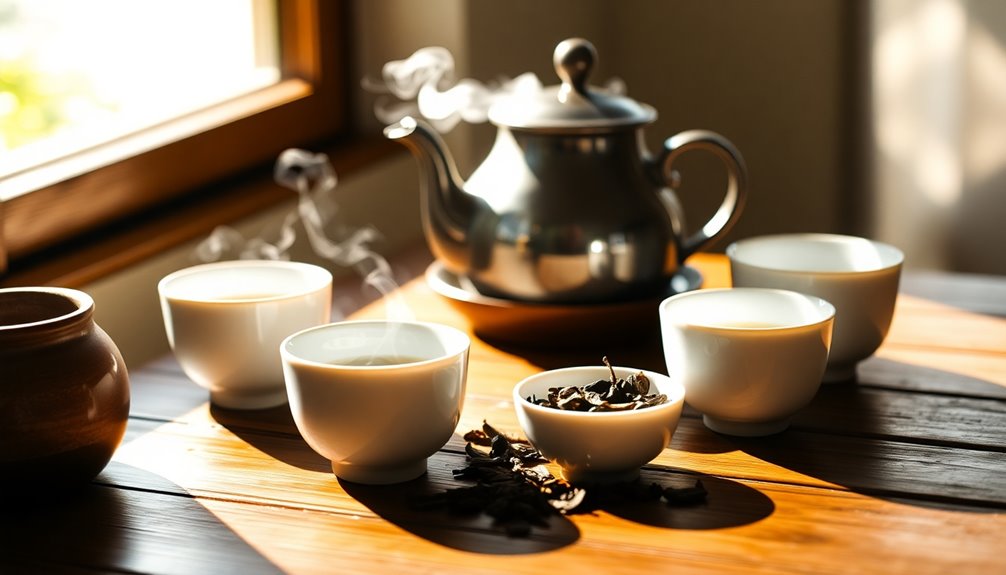
The way you prepare tea plays a crucial role in shaping its flavor profile. When boiling water, you're not just heating; you're releasing aromatic compounds essential for your favorite teas. Each type of tea requires specific temperatures to achieve optimal flavor extraction, so knowing this can make a big difference.
Measuring the right amount of tea leaves—about 1 teaspoon per 8 ounces of water—ensures a balanced brew that highlights the unique characteristics of every cup.
Steeping time is equally important. Allowing high-quality teas to steep for the recommended 15-30 seconds prevents bitterness and helps maintain their intended taste. Using quality teaware, like Yixing pots, can also enhance flavors over time, as they absorb and season with aromas from previous brews.
Don't underestimate the ritual of rinsing your tea leaves before steeping. This simple step awakens the leaves, allowing them to expand and release their full potential during the infusion process.
Tea Temperature Affects Taste

Getting the temperature right is essential for brewing tea that truly shines. Different types of tea require specific steeping temperatures to unlock their optimal flavor profiles.
For instance, you should brew black and herbal teas at boiling temperature (212°F) for the best results. In contrast, green and white teas are best steeped at around 170°F to preserve their delicate flavors.
If you're enjoying oolong tea, aim for around 190°F. This temperature allows fuller extraction while minimizing bitterness. Remember, overheating tea leaves can release undesirable tannins, leading to a bitter taste, so precise temperature control is crucial during brewing.
Brewing tea at the appropriate temperature not only enhances flavor but also preserves the beneficial compounds, like antioxidants and polyphenols, contributing to tea's health benefits. Additionally, the caffeine content can vary significantly depending on the type of tea and its brewing conditions.
To ensure you get each type of tea just right, consider using a thermometer or a variable temperature kettle. These tools help you achieve the ideal tea temperature, maximizing your enjoyment and the health benefits of every cup.
Brewing Method Debates
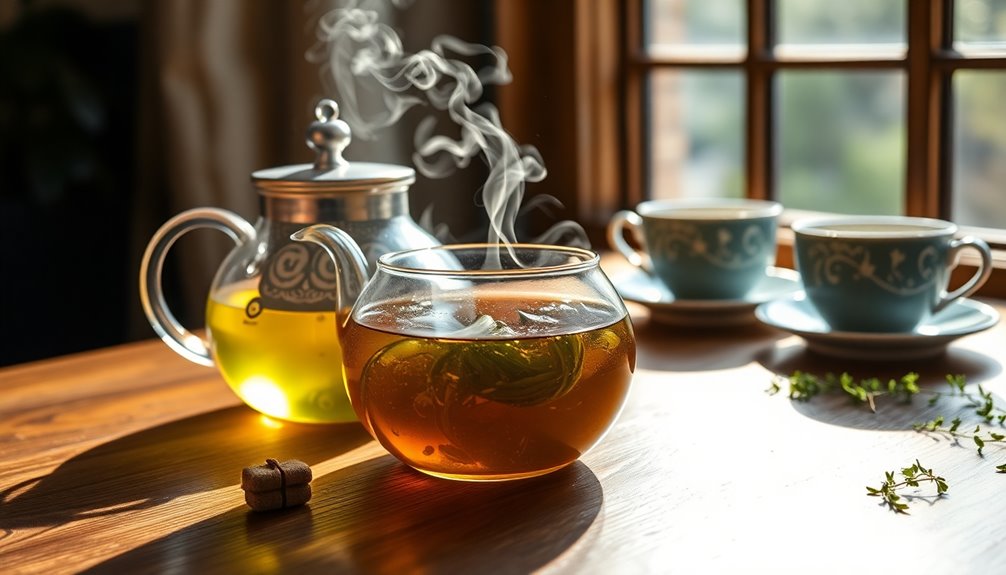
Many tea enthusiasts debate the best brewing methods, as each technique can dramatically influence flavor extraction and overall enjoyment. Different tea types require specific approaches; for instance, using boiling water for black tea versus cooler temperatures for green tea can result in vastly different flavors. Herbal teas, on the other hand, often benefit from appropriate steeping times to maximize their unique flavors and health benefits.
Techniques like Gong Fu Cha, which emphasize multiple short infusions, allow you to unlock a range of taste profiles from oolong and pu-erh teas, enriching your experience. Your choice of teaware also plays a crucial role. Yixing clay pots and glass teapots have unique properties that interact with heat and aroma, further affecting how your tea tastes.
Consistency in your brewing practices is essential, too. By measuring tea leaf quantity and steeping times, you'll be able to refine your method and understand your personal flavor preferences better. Don't forget to experiment with water quality. Using filtered or spring water can dramatically enhance the taste of your tea, while impurities in tap water may detract from the overall experience. Incorporating low carb foods into your diet can further enhance your overall wellness, allowing for a more enjoyable tea experience.
Practical Applications
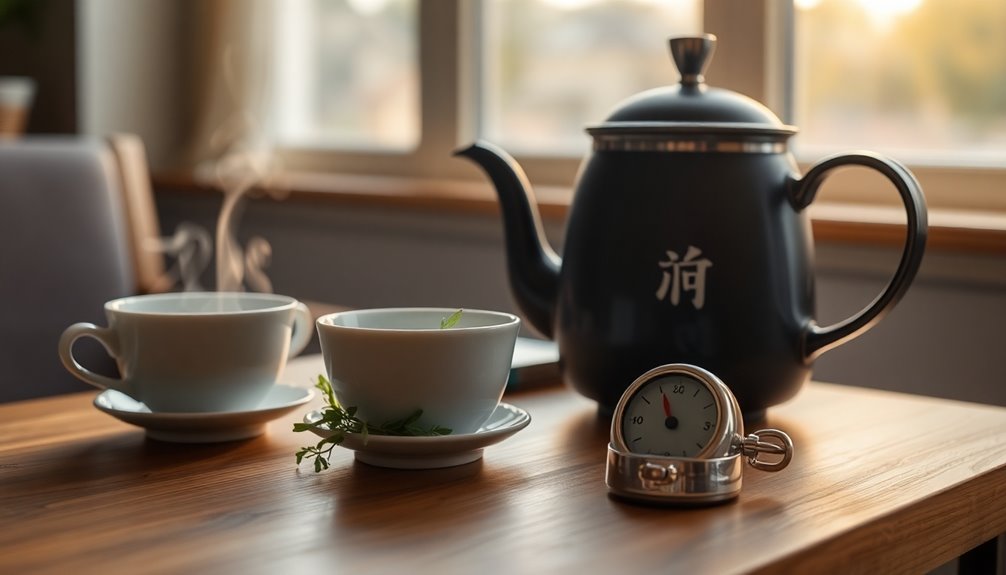
Although brewing tea might seem straightforward, incorporating structured rituals can significantly elevate your experience. By measuring tea leaves and observing water temperature, you enhance the sensory engagement with every cup. When you steep your tea with intention, research shows you'll likely notice a heightened perception of taste and enjoyment. This mindful approach not only makes drinking tea more pleasurable but also transforms it into a moment of connection.
To deepen this connection, consider integrating breathing exercises during the steeping process. Focusing on your breath helps ground you in the present moment, allowing you to appreciate the subtle flavor changes that occur as your tea steeps. Rituals like these create familiarity and comfort, making your tea-drinking experience more meaningful.
As you consistently practice these rituals, you'll find that the act of drinking tea becomes a cherished part of your routine. The added bonus is that you'll develop a more profound connection with the tea you consume, savoring each sip and enhancing your overall satisfaction.
Conclusion
Incorporating rituals into your tea routine can truly elevate your experience. By engaging your senses, you'll notice how preparation and temperature play crucial roles in flavor. Don't underestimate the impact of your brewing method either; it can spark lively debates among tea lovers. So, next time you brew a cup, take a moment to savor the process and embrace the little rituals. You might find that they make your tea taste even better than before. Enjoy!

